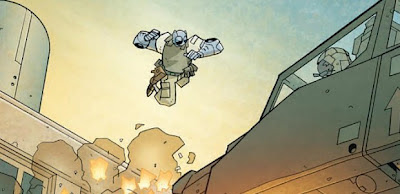Along with my increasing tendency to miss shows on TV, and catch up with them on box-sets, I've also long since stopped buying "floppy" comics and started getting collections of series that I like. This has three main advantages - the first is that I can exert some degree of budgetary control over what I buy, rather than just buying pretties in a comic shop every week. The second is that I actually re-read them, because pulling them off a shelf in an single volume is easier than digging out a pile of issues, although it's less kinethestically satisfying. The final reason is that I can pick up stuff on recommendation, which means that these days I read very little "Big Two" and a lot more small and indie-press stuff.
I've mentioned Atomic Robo before, and how wonderful it is, and the new trade is something I've been looking forward to for a while. It's also been billed here and there as "the darkest Atomic Robo story yet", which is an interesting line to take for a series so keen on being accessible and all-ages friendly. I can't deny that I'm sufficiently jaded on "dark" for anyone using the phrase to give me a slight chill.
Thankfully, "dark" by Atomic Robo standards is still bright, fun and accessible, with the moodier, more thoughtful elements left in the subtext where they can be appreciated without getting in the way of the sort of thing I've come expect from the series - uptempo action-action adventure in the best pulp tradition. So yay! for that. This time we are back in the modern day, and after a routine (well, routine for Robo) rescue mission in space goes wrong, all the secret conspiracy groups in the world seem to be gunning for our hero. Meanwhile, a whole building has gone missing from former British Intelligence Station Bletchley Park. How could these events be connected?
Like all the Atomic Robo stories this pretty much stands alone, with a lot of nods to the wider continuity of Robo's life adding depth and texture without being critical plot points you'd need explaining to you. It's nice to see Sparrows grandson, for instance, but you don't need to know the history for the character to work in the story. For me this sort of writing is one of the hallmarks of the series; a consistent wider world that brings a lot of depth whilst constantly allowing new readers in the door due to compartmentalized arcs. There are real advantages to writing this way, and its very in keeping with the creative teams self-professed mission statement, and makes it the sort of book that is easy to pass around and try and hook more people in.
As for content - well, the story is as pacey and explosive as ever, with the usual eclectic bag of inspirations you'd expect if you've read any Atomic Robo before, and may be surprised by if you hadn't. Personally I loved the Akira shout-outs in the art work towards the end, but then I'm very fond of my Akira collections. There is also a great sense of sadness that comes through the final issue - something I don't want to spoil, but can't not mention - a sort of angry melancholy that the story lets Robo express before going to back to the running and exploding and quipping. When we talk about "dark" here, thats what they mean; a flash of something more complex and interesting, and difficult than the usual fare, but stays as that flash, rather than wandering all over the story waving it's hands around shouting "look at me! i'm dark and moody!".
In fact, I think I only have one criticism of the volume, and that is the total lack of Dr Dinosaur. Everything needs more Dr Dinosaur!
My Hero.



No comments:
Post a Comment